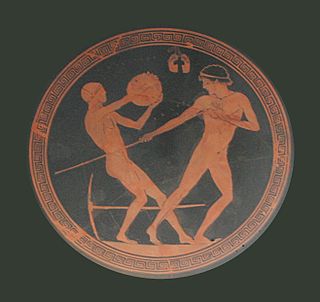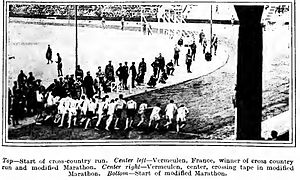
Athletics is a group of sporting events that involves competitive running, jumping, throwing, and walking. The most common types of athletics competitions are track and field, road running, cross-country running, and racewalking.

Track and field is a sport that includes athletic contests based on running, jumping, and throwing skills. The name is derived from where the sport takes place, a running track and a grass field for the throwing and some of the jumping events. Track and field is categorized under the umbrella sport of athletics, which also includes road running, cross country running and racewalking.
The World Athletics Championships are a biennial athletics competition organized by World Athletics. Alongside the Olympic Games, they represent the highest level championships of senior international outdoor athletics competition for track and field athletics globally, including marathon running and race walking. Separate World Championships are held by World Athletics for certain other outdoor events, including cross-country running and half-marathon, as well as indoor and age-group championships.
At the 1900 Summer Olympics, twenty-three athletics events were contested. Altogether, 117 athletes from 15 nations competed. A total of 68 medals were awarded. In many countries, due in part to the conflation of the Olympic Games and the World's Fair in Paris, the media discussed only the athletics events under the "Olympic" name while ignoring the incredible variety of other sports featured at the time.

A pentathlon is a contest featuring five events. The name is derived from Greek: combining the words pente (five) and -athlon (competition). The first pentathlon was documented in Ancient Greece and was part of the Ancient Olympic Games. Five events were contested over one day for the Ancient Olympic pentathlon, starting with the long jump, javelin throwing, and discus throwing, followed by the stadion and wrestling. Pentathletes were considered to be among the most skilled athletes, and their training was often part of military service—each of the five events in the pentathlon was thought to be useful in war or battle.

The track and field competition at the 2011 Military World Games was held from 17–23 July 2011 at the Estádio Olímpico João Havelange in Rio de Janeiro. The programme contained 35 athletics events, 20 for men and 15 for women. The marathon races took place on 17 July while the track and field events were held in the stadium from 19–23 July.
In India, the sport of athletics was introduced during the period of the British Raj. The sport is governed at national level by the Athletics Federation of India, which was formed in 1946. Despite its large population, few Indian athletes have won a medal in a global or major championship. This began to change in the 21st century, when Indians started taking greater interest in athletics more generally and improved facilities for the sport began to be built at a local level. At a continental level, it has been among the more successful Asian nations, though some distance behind China and Japan.

Athletics at the 2016 Summer Olympics were held during the last 10 days of the games, from 12 to 21 August 2016, at the Olympic Stadium. The sport of athletics at the 2016 Summer Olympics was made into three distinct sets of events: track and field events, road running events, and racewalking events.

The AAA Championships was an annual track and field competition organised by the Amateur Athletic Association of England. It was the foremost domestic athletics event in the United Kingdom during its lifetime, despite the existence of the official UK Athletics Championships organised by the then governing body for British athletics, the British Athletics Federation between 1977 and 1993, and again in 1997. It was succeeded by the British Athletics Championships, organised by the BEF's replacement/successor, UK Athletics under its brand name British Athletics.
The sports under the umbrella of athletics, particularly track and field, use a variety of statistics. In order to report that information efficiently, numerous abbreviations have grown to be common in the sport. Starting in 1948 by Bert Nelson and Cordner Nelson, Track & Field News became the leader in creating and defining abbreviations in this field. These abbreviations have also been adopted by, among others, World Athletics; the world governing body, various domestic governing bodies, the Association of Track and Field Statisticians, the Association of Road Racing Statisticians, the Associated Press, and the individual media outlets who receive their reports. These abbreviations also appear in Wikipedia.

At the 1999 Military World Games, the track and field events were held at the Sportski Park Mladost athletic stadium in Zagreb, Croatia from 11–16 August. A total of 32 events were contested, of which 22 by male and 10 by female athletes. The marathon events were held on 11 August, prior to the track and field competition. It was the last time that the men's 20 kilometres walk and women's shot put featured on the programme. The women's 1500 metres and 5000 metres were added to the programme for the first time. Nations could enter a maximum of two athletes into each event.
The track and field competition at the 2015 Military World Games was held from 4–11 October 2015 at the KAFAC Sports Complex in Mungyeong. The stadium is named after the Korea Armed Forces Athletic Corps. The marathon races took place on 11 October and followed a route around the city with a finish point at the track and field main stadium. A number of para-athletics exhibition events were added to the programme for the first time, covering men's and women's shot put, and track races over 100 m, 200 m, and 1500 m for men.

The French Athletics Championships is an annual outdoor track and field competition organised by the Fédération française d'athlétisme, which serves as the French national championships for the sport. The three-day event is typically held in early or mid-summer and the venue varies on an annual basis. It is open to adults of all ages and is thus referred to as the senior or élite championships.

The Spanish Athletics Championships is an annual outdoor track and field competition organised by the Royal Spanish Athletics Federation (RFEA), which serves as the Spanish national championship for the sport. It is typically held as a two-day event in the Spanish summer around late June to early August. The venue of the championships is decided on an annual basis.
The World Athletics Rankings are an individual athlete ranking system for the sport of athletics, managed by World Athletics. It is used to establish the number one athlete within an athletics event and to partially determine qualification into the World Athletics Championships and the athletics at the Summer Olympics. The rankings are published weekly by World Athletics on Wednesday. WA President Sebastian Coe said the goal of this system is so athletes and fans "have a clear understanding of the hierarchy of competitions from national through to area and up to global events, allowing them to follow a logical season-long path to the pinnacle of athletics' top two competitions".

The Mediterranean Athletics Championships were an annual outdoor track and field competition between nations in the Mediterranean region that took place from 1947 to 1949. These events were a precursor to the Mediterranean Games, founded in 1951.

The Match Europe v USA was an international two-day outdoor track and field competition between the United States and Europe. It took place 9–10 September 2019 in Minsk, Belarus, three weeks prior to the 2019 World Athletics Championships in Doha, Qatar, a few days after the conclusion of the 2019 Diamond League and three months after the 2019 European Games.

Athletics at the 2024 Summer Olympics in Paris are scheduled to run over a ten-day period at four different venues from 1 to 11 August 2024, featuring a total of 48 medal events across three distinct sets: track and field, road running, and racewalking.
In the course of its history, the sport of athletics (track and field) has undergone many changes. This article presents the changes to the rules of competition as well as to major events in the sport.











